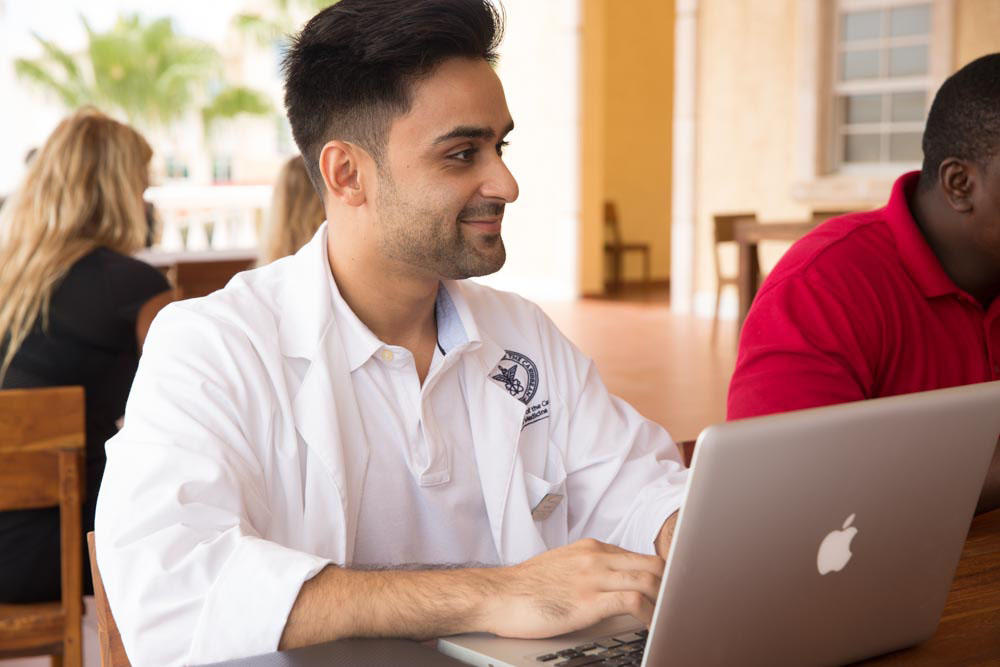Students interested in going to medical school know that the MCAT is on the horizon. This usually brings up the question: what is the MCAT? What MCAT subjects do you need to study for? Along with several other MCAT FAQs. The Medical College Admission Test (MCAT), is a standardized, multiple-choice exam administered by the Association of American Medical Colleges (AAMC).
The test is required for students wanting to enter a four-year medical school—such as the American University of the Caribbean School of Medicine (AUC). High MCAT scores are crucial to acceptance in medical school. The test helps medical school admissions offices assess a student’s problem-solving skills, critical thinking, and knowledge of behavioral, natural, and social science concepts and principles prerequisite to the study of medicine.
Considering the importance of the MCAT, prospective medical students surely have a lot of questions about the exam. Below are answers to some of the most frequently asked questions—the MCAT FAQ's.
WHAT IS ON THE MCAT?
The MCAT includes content from introductory-level courses at undergraduate institutions, including biology, general and organic chemistry, and physics, as well as first-semester biochemistry, psychology, and sociology.
WHO SHOULD TAKE THE MCAT?
Students who are going to apply to a health professions school must take the MCAT. Such schools include programs granting Doctor of Medicine (MD) degrees—such as AUC—Doctor of Osteopathy (DO) degrees, Doctor of Podiatric Medicine (DPM) degrees, and Doctor of Veterinary Medicine (DVM) degrees. Students bound for other health-related programs that accept MCAT results may also take the test. At MCAT registration, students must verify their intention to apply to health professions or health-related programs.
HOW MUCH DOES THE MCAT COST?
Another common MCAT FAQ is how much does it cost to take the exam? The cost to take the MCAT is $320, but some students may qualify for a reduced fee assistance program, which lowers the student’s cost to $130. Students taking the MCAT outside the United States or Canada have to pay an additional $115 international fee.
WHEN IS THE MCAT TAKEN?
Students often inquire when to take the MCAT. The MCAT is typically taken a year before applying to medical school. The exam is offered many times per year, but students should begin preparing long before testing day. Students should study MCAT preparation guides and take MCAT preparation courses and MCAT practice tests. Students are recommended to begin preparing at least six months in advance. Students should also be aware that registration takes place three to four months before the MCAT testing date.
WHERE IS THE MCAT TAKEN?
The MCAT exam is taken at testing sites throughout the United States and Canada as well as at numerous sites in countries around the world. The testing company Pearson VUE hosts MCAT exams at Pearson VUE Authorized Test Centers or at Pearson Professional Centers—secure sites made specifically for high-stakes academic tests.
WHAT COVID-19 PRECAUTIONS AND PROTOCOLS ARE REQUIRED TO TAKE THE MCAT?
As of May 2021, students must wear masks at all MCAT testing centers, and fees have been waived for students who need to cancel or reschedule their exams
WHAT IS MCAT TEST DAY LIKE?
Many students wonder what is the MCAT test day like? Students arrive at the MCAT testing center and check in with a test administrator. Students then present valid identification and sign in—they also have their photograph taken and their palm digitally scanned.
The testing center provides the items needed to take the MCAT—a noteboard booklet, fine point marker, storage key, and earplugs. All notes, cell phones, bags, or other personal items are strictly prohibited. There are two ten-minute breaks during the exam, and one thirty-minute mid-exam break. During the breaks—which are optional—students may access food, water, or medication.
HOW IS THE MCAT SCORED?
The MCAT is divided into four sections:
- Biological and Biochemical Foundations of Living Systems (BBLS)
- Chemical and Physical Foundations of Biological Systems (CPBS)
- Psychological, Social, and Biological Foundations of Behavior (PSBB)
- Critical Analysis and Reasoning Skills (CARS)
Each section is scored from a low of 118 to a high of 132, with a midpoint of 125. Scores for the four sections combine for the total score, which ranges from a low of 472 to a perfect 528. The midpoint is 500.
MCAT scores include a percentile rank, which shows how a student’s scores compare to others. A 125 score on a section or an overall 500 score ranks at 50 percent—exactly in the middle with half doing worse, half doing better. The higher the percentile rank, the better the student did. MCAT scores and percentile ranks are released 30 to 35 days after the exam.
HOW LONG IS THE MCAT?
The BBLS section of the MCAT gives students 95 minutes to answer 59 questions. CPBS has 53 questions to answer over a 90-minute time period. PSBB and CARS both have 59 questions over 95 minutes. Quick math: students have 6 hours and 15 minutes to answer 230 questions.
Students may finish a section before the given time expires and move on to the next section without waiting. Students may also skip breaks. A confident, quick, and durable test taker may finish the MCAT in fewer than six hours.
HOW HIGH DO STUDENTS NEED TO SCORE ON THE MCAT?
In the United States in 2020, AAMC data show that students accepted to medical schools had an average MCAT score of 511.5. This is a very good score, but such high standards exclude numerous exceptional students. Matriculant (accepted student) MCAT averages are slightly lower among medical schools in the Caribbean, which tend to take a more holistic approach to admissions. This process considers an applicant as a whole person rather than a mere set of grades and scores.
HOW MANY TIMES CAN YOU TAKE THE MCAT?
To achieve higher scores, students may take the MCAT more than once. Students can take the test up to three times in one year, four times in two years, or seven times in a lifetime.
DO STUDENTS BEYOND THE UNITED STATES AND CANADA TAKE THE MCAT?
Students beyond the United States and Canada may take the MCAT, but similar tests from other countries may accompany or—at times—replace the MCAT. In the United Kingdom, medical school hopefuls take the University Clinical Aptitude Test (UCAT). In India, they take the National Eligibility cum Entrance Test (NEET). In Australia, students take the Graduate Medical School Admissions Test (GAMSAT).
CAN STUDENTS TALK ABOUT THE MCAT AFTER TAKING IT?
At registration, students sign an examinee agreement that prohibits them from disclosing the contents or exact order of the MCAT, describing questions in detail, or speculating on what passages are field tests or experimental items. Test takers may, however, talk about the general test experience.
The American University of the Caribbean School of Medicine trains tomorrow’s physicians, whose service to their communities and their patients is enhanced by international learning experiences, a diverse learning community, and an emphasis on social accountability and engagement. Take the MCAT, and then take the next step toward becoming a physician: apply for admission to AUC.
Related resources:




